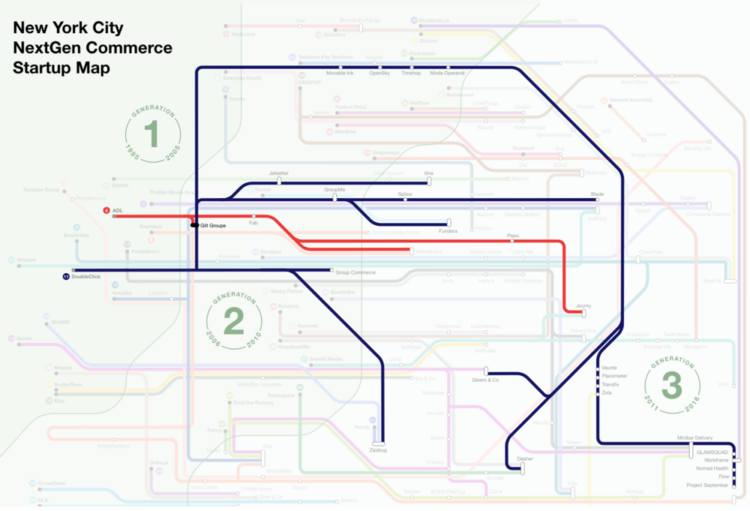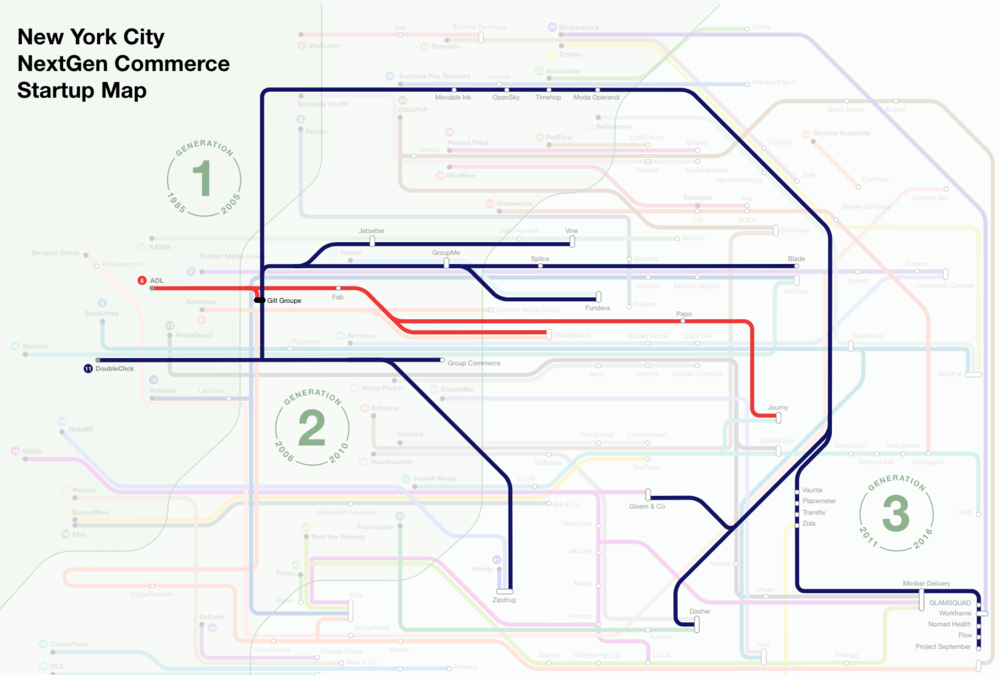I made my first real foray into digital commerce back in 2010 when I joined Gilt Groupe’s marketing team. I had been in investment banking prior to that, but having started a small e-commerce bike business in high school, I’ve always been amazed by the ability of the internet to reinvent commerce across new categories. Needless to say, I jumped at the opportunity to work with one of the fastest-growing digital commerce companies in NYC at the time.
One of the most critical factors behind Gilt’s success was its impeccable sense of timing. The company got its start in the early innings of the apparel industry’s shift online, as e-commerce penetration grew from 17% in 2010 to 20% in 2016. Gilt also had the massive advantage of some dramatic changes in the technology cycle, namely the platform shift to mobile and email as a new channel for marketing and engagement. The company used both of these factors to its advantage as it went about building a differentiated shopping experience that leveraged a unique, one-to-one relationship with its customers – something legacy fashion retailers could simply not replicate at the time.
But perhaps the most important aspect of Gilt’s timing was its emergence just after the financial crisis of 2008. The resulting drop in household wealth drove consumers to seek out more value for discretionary spending and new shopping experiences. Gilt’s uniquely addictive flash sale model played into that consumer psyche, kicking off the next wave of digitally native commerce companies.
Gilt was ultimately sold for $250 million to Hudson’s Bay in 2016, but the revitalized shopping experience it created by managing a direct relationship with its customers made an enormous impact on the next wave of digital commerce companies. That pioneering approach inspired a new generation of founders from the Gilt ranks, including Zola, Flow, HQ Trivia and now CoEdition, a curated fashion marketplace for women size 10 and up, which launched in March. Building on the success of emerging brands and retailers in the category (Eloquii, Universal Standard, Dia&Co, 11Honore), as well as on the scale of legacy retailers (Lane Bryan, Torrid, FullBeauty) catering to this underserved audience, CoEdition is intent on providing an elevated shopping experience that provides the best selection of contemporary merchandise, while helping consumers find the right size and fit.
CoEdition is the brainchild of former Gilt founders and operators Kevin Ryan, Brooke Cundiff, Kent Helbig and Keith George, the former Chief Merchandising Officer at Gilt and now CEO of CoEdition – all of whom I had the personal benefit of working with during my time at the company. The team brings deep-rooted merchant backgrounds and experience scaling digital commerce companies through hyper-growth. Having learned a thing or two about timing from their Gilt days, CoEdition’s entrance coincides with some major shifts in the plus-size industry.
- Industry imbalance primed for a reboot: The plus-size apparel market in the U.S. represents a $40 billion market opportunity, growing 6% year over year, double that of traditional apparel. And yet retailers in this space have been unable to meet the needs of the community, leaving consumers with subpar offerings that either lack a modern, fashion-forward look, or that are made with substandard materials. Dissatisfied with the options available to them, it’s no wonder that, while 70% of American females are size 12 or above, they contribute just 16% of US apparel spend. To correct this imbalance, CoEdition is taking a fresh approach, offering a curated selection of contemporary clothing from top brands – including Stuart Weitzman, Tahari, Rachel Roy, Cynthia Rowley and others – to give these consumers both the style, selection and service they have long-desired.
- Apparel e-commerce accelerates: Following in the footsteps of books/media (33%) and consumer electronics (32%), apparel e-commerce has been accelerating rapidly, expected to grow from $72 billion in 2016 to $123 billion in 2021, or roughly 28% penetration of the total apparel market (versus 20% today). While Amazon, Walmart and Target will continue to grow their third-party and private-label businesses, several large legacy retailers will fade away, allowing the category to experience both share shift and market expansion. This is certainly not a winner-take-all category. Innovative new entrants will have room to differentiate themselves by offering proprietary merchandise and service offerings that more closely align with audience’s pain points beyond free and fast shipping.
- Instagram scales for visual inspiration: Fashion is an aspirational category, driven largely by what we see others wearing. Historically, this discovery was driven by fashion magazines, runway shows and physical storefronts, but modern consumers are more often now finding inspiration on Instagram and other digital channels. As Instagram’s reach has skyrocketed – now hitting 900 million MAUs – the platform has become an enabler for both emerging brands and influencers to better interact with and inspire traditionally underserved consumers, across size, gender, race and other consumption behaviors.
- Inclusivity is king: Countless headlines covering discrimination, gender inequality, hate crimes, bullying, workplace harassment and more have given rise to a very positive, inverse reaction, which has seen the rise of movements such as Black Lives Matter, Me Too, pushes for diversity in the tech world, and more. These movements have carried over into the beauty and fashion worlds, where the proportion of minority and plus-size models is on the rise, showcasing a variety of shapes, sizes and colors outside of the previously limited definitions of “beauty”. This has opened the door for new businesses catering to previously overlooked audiences, but it’s also driving consumers to be more discerning about spending money with companies whose mission aligns with their own.
CoEdition is well-positioned to capitalize on these trends as it builds a revitalized shopping platform for the plus-size community. I am extremely excited by CoEdition’s mission, and honored to back a team – alongside our friends at NEA, General Catalyst and BBG Ventures – with the proven know-how and experience to deliver a great customer experience.




